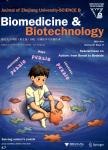Angiopoietin-1 preconditioning enhances survival and functional recovery of mesenchymal stem cell transplantation
Angiopoietin-1 preconditioning enhances survival and functional recovery of mesenchymal stem cell transplantation作者机构:Cardiovascular Key Lab of Zhejiang Provincethe Second Affiliated HospitalSchool of MedicineZhejiang UniversityHangzhou 310009China Department of Cardiologythe Second Affiliated HospitalSchool of MedicineZhejiang UniversityHangzhou 310009China Department of Intensive Care UnitZhejiang Provincial Hospital of Traditional Chinese MedicineHangzhou 310006China
出 版 物:《Journal of Zhejiang University-Science B(Biomedicine & Biotechnology)》 (浙江大学学报(英文版)B辑(生物医学与生物技术))
年 卷 期:2012年第13卷第8期
页 面:616-623页
核心收录:
学科分类:1002[医学-临床医学] 100201[医学-内科学(含:心血管病、血液病、呼吸系病、消化系病、内分泌与代谢病、肾病、风湿病、传染病)] 10[医学]
基 金:supported by the Natural Science Foundation of Zhejiang Province (No. Y2100362) the Qianjiang Talents Project of Science and Technology Department of Zhejiang Province (No. 2011R10022), China
主 题:Mesenchymal stem cells Angiopoietin-1 Preconditioning Survival Myocardial infarction
摘 要:Objective: Mesenchymal stem cell (MSC) transplantation is a promising therapy for ischemic heart diseases. However, poor cell survival after transplantation greatly limits the therapeutic efficacy of MSCs. The purpose of this study was to investigate the protective effect of angiopoietin-1 (Angl) preconditioning on MSC survival and sub- sequent heart function improvement after transplantation. Methods: MSCs were cultured with or without 50 ng/ml Angl in complete medium for 24 h prior to experiments on cell survival and transplantation. 3-(4,5- Dimethylthiazol-2-yl)-2,5-diphenyltetrazolium bromide (MTT) and Hoechst staining were applied to evaluate MSC survival after serum deprivation in vitro, while cell survival in vivo was detected by terminal deoxynucleotidyl trans- ferase biotin-dUPT nick end labeling (TUNEL) assay 24 and 72 h after transplantation. Heart function and infarct size were measured four weeks later by small animal echocardiography and Masson's trichrome staining, respectively. Results: Angl preconditioning induced Akt phosphorylation and increased expression of Bcl-2 and the ratio of Bcl-2/Bax. In comparison with non-preconditioned MSCs, Angl-preconditioned cell survival was significantly in- creased while the apoptotic rate decreased in vitro. However, the PI3K/Akt pathway inhibitor, LY294002, abrogated the protective effect of Angl preconditioning. After transplantation, the Angl-preconditioned-MSC group showed a lower death rate, smaller infarct size, and better heart functional recovery compared to the non-preconditioned-MSC group. Conclusions: Angl preconditioning enhances MSC survival, contributing to further improvement of heart function.



